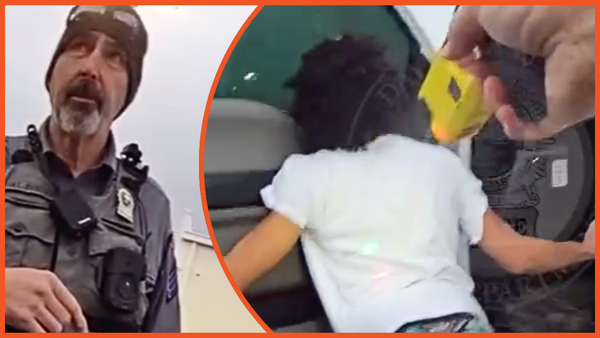
Tunisian security forces in Sfax have rounded up hundreds of people from sub-Saharan Africa, including children, and dropped them in a no man’s land between the Tunisian and Libyan border, where they remain trapped with neither food nor water. These forced deportations carried out by the security services come against a backdrop of heightened anti-migrant rhetoric and violence that broke out in Sfax the night of July 3. Our team spoke to a man from the Ivory Coast who said that some people had died and more than 300 people are trapped at the border in terrible conditions.
Our team spoke to a man from the Ivory Coast, who we are calling Adama, who told us that Tunisian security forces forcibly deported him, along with about 20 other migrants, dropping them off at the border on the night of July 2. This was a day before clashes broke out in Sfax. The ongoing violence has been accompanied by a wave of migrant arrests.
In the days since, Tunisian security forces have forcibly deported several other groups of migrants to the same no man’s land between Tunisia and Libya.
Adama sent his location to our team on July 6 – he’s in an area next to the coast, not far from the border post in Ras Jdir.
'I told UN agencies but the Tunisian authorities haven’t yet allowed them to meet with the group of people stranded'
Lauren Seibert, a researcher with the NGO Human Rights Watch, found out about the vulnerable people dropped in the desert when she came across a tweet on July 3.
I talked to some of them and they told me that the security forces had beaten them and also broken their phones. The group included both pregnant women and children. I discovered that at least two of the people were registered as asylum seekers with the UN High Commissioner for Refugees. I told UN agencies but the Tunisian authorities haven’t yet allowed them to meet with the group of people stranded.

'Some are drinking sea water'
Adama lives in Tunis but was travelling through Sfax when he was arrested on July 2. He told us that the conditions are getting worse for the people stranded there. Neither the Tunisian border guards nor the Libyan border guards will let people pass.
There are at least 300 of us, near the border. The National Guard arrested us in different locations – in Sfax, but also in small villages near Tunis.
They didn’t give us any kind of explanation, they just left us here, next to the sea. Without food or water. Some people have been drinking sea water.
I am from the Ivory Coast but there are a lot of other nationalities – people from Cameroon, Senegal, Chad, Togo, Benin, Guinea and Mali.

The children have started getting sick from dehydration. We don’t have medicine and a lot of people have injuries from when the National Guard beat us with batons [Editor’s note: Adama sent our team images of people with head injuries as well as injuries to their arms, legs and feet].


We tried on several occasions to get back into Tunisia – even just to buy a bit of food, but the soldiers prevented us. They even threw stones at us. And, once, a man in civilian attire tried to chase us with a baton.

We tried to get to the Libyan side also but the guards told us to back off. And later, they burned down one of our tents [Editor’s note: a makeshift shelter built with sheets]. It is more and more tense. We asked for water from the Libyans, but in vain.
On Wednesday afternoon, an NGO tried to get to us, but the Tunisian soldiers wouldn’t allow them access. A Spanish journalist also tried to see us, but they wouldn’t let him through either. They threw us into this place so we can’t get out. Help us, please!
Adama said that at least three people had died from their injuries. We were unable to confirm this.
The situation for migrants in Tunisia has deteriorated drastically in the past few months. There has been an increase in anti-migrant rhetoric – including by the president himself. President Kais Saied has claimed that migrants are part of a conspiracy to replace the Tunisian population – a theory championed by the Tunisian nationalist party. In February 2023, Saied said that the “hoards of illegal migrants” should be deported and denounced a “criminal plan” aimed at “changing the demographic makeup” of the country.
The latest wave of violence was sparked by the death of a Tunisian, blamed on three sub-Saharan Africans.
Read moreFootage shows sub-Saharan African migrants being attacked and expelled over 48 hours in Tunisia
Tunisian politician Moez Barkallah told the news agency Tunis Afrique Presse (TAP) that, since June 28, a total of 1,200 people from sub-Saharan Africa had been deported via Sfax to the borders with Libya and Algeria.
The start of summer has meant that more migrants are travelling to Sfax, where they are waiting to board boats headed to Europe, especially the nearby Italian island of Lampedusa.







